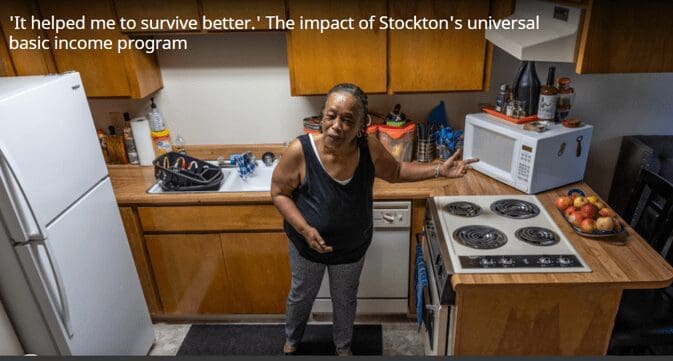The country’s first guaranteed income experiment could be a model for a national roll-out of Universal Basic Income.
A residential fire tore through a northern Stockton apartment building almost two years ago and displaced over a dozen people. Laura Plummer, 70, a grandmother, retired union woman, and bona fide go-getter, was one of them.
She’s been resilient all her life, though. When the San Francisco native graduated high school, she was pregnant with her third child. A few years later, she said she fled her abusive ex-husband and became a single parent in Los Angeles. She advanced from an L.A. grocery clerk to an office clerk in Silicon Valley, to eventually SEIU chapter treasurer when she worked at the Oakland Coliseum for 21 years.
Plummer’s hustler spirit has been a constant. Now she’s enjoying her golden years in Stockton, as sassy as ever.
“I was working any job that paid good money to help me raise my three kids,” Plummer said. “Never took a job going down. The money always had to go up.”
Being homeless for several months was just another part of Plummer’s story. As I sat in the living room of her Stockton townhome on a sweltering August afternoon, I quickly learned that she has many to tell.
Plummer had renter’s insurance “because I’m not a dummy,” she said, so her losses from the fire were covered. But as a retiree dependent on social security, Plummer avoided a more precarious tumble because she was one of the 125 Stockton residents who received $500 every month, no strings attached, under the groundbreaking Stockton Economic Empowerment Demonstration that began in February 2019.
Under the country’s first guaranteed income experiment, Plummer was able to supplant food bank trips with regular grocery store visits, she said. She paid off her credit cards and auto loan. She was also able to host family feasts with steak or gumbo, which helped her keep tabs on her grandchildren.
“It helped me survive better. It helped me live better,” Plummer said. “When you get to the grocery store and you want to buy something but you can’t because you don’t have the money, that gets a little tiring after a while.”
The pandemic caused a sea change on universal basic income as people across the ideological spectrum realized the power of direct cash payments under federal and state COVID relief bills. Undeniable data, from the Stockton program and multiple rounds of stimulus checks, showed that people were able to buy food, pay their bills, and were mentally healthier as a result.
When the pandemic subsides, there is a real foundation — built by proven policy, unbiased data, and rising political will — to establish guaranteed income programs in every city.
It’s the next great American social experiment, and it has the potential to be the most effective anti-poverty measure of the 21st century.
This summer, Sacramento joined the growing movement. And if Mayor Darrell Steinberg’s American Rescue Plan Act proposal passes as expected, the city will be putting its own skin in the game to help double the initiative.
PANDEMIC HARDSHIP PROVIDED OPPORTUNITY
The demand for resources on launching basic income programs has increased tenfold during the pandemic, said Sukhi Samra, director of Mayors for a Guaranteed Income. Her organization went from helping 11 mayors to nearly 60, she said, with at least 15 pilots preparing to launch.
The cities span red states and blue states, including places such as Richmond, Virginia, St. Paul, Minnesota, Atlanta, Georgia, and Gary, Indiana.
“This isn’t just a liberal idea that works on the coast,” Samra said. “It’s something that works for everyone. Economic security does not discriminate, and our policies shouldn’t either.”
Indeed, it feels like a moment for guaranteed income, once a fringe anti-poverty policy introduced by economist Milton Friedman after World War II and later written about by Dr. Martin Luther King Jr. as a tool for economic justice.
But it wasn’t until Andrew Yang’s presidential campaign that basic income became a mainstream idea or one with bipartisan appeal.
Conservative thinkers like Charles Murray believe universal basic income could end the so-called welfare state by reviving civic engagement and giving people the security to withstand a radically changing job market, he wrote in a 2016 essay in the Wall Street Journal.
Ex-Stockton Mayor Michael Tubbs, the political wunderkind who launched the nation’s first guaranteed income program in his hometown, deserves credit for bringing the idea to life.
Yet in a cruel twist, it required the economic devastation of the pandemic to demonstrate the merits of guaranteed income. Tying basic necessities such as food and shelter to a job was exposed as a formula for disaster almost overnight.
However, it also created an opportunity once federal stimulus dollars were funneled into cities and local officials had to figure out how to reduce hardship. Basic income quickly became a popular experiment.
“(The pandemic) exposed the fault lines of the lies we told ourselves about the economy,” Tubbs said. “It illustrated how fragile folks’ economic positions are, and this was caused by a public health hazard and not the market failure, but a bug.”
There’s some type of program in several California cities now, including Compton, Los Angeles, Oakland, San Francisco, Long Beach, San Diego, and National City. That momentum inspired state legislators to push for a $35 million package in this year’s budget to help introduce basic income programs around the state. Gov. Gavin Newsom backed it, and Tubbs, now a special economic advisor for Newsom’s administration, is expected to play a key role in that effort.
SACRAMENTO PREPARING TO EXPAND
In June, United Way California Capital Region began providing $300 per month to 100 families around Sacramento County. The two-year, $720,000 program is helping households that were 150% of the state poverty level, or less than $40,000 for a family of four. Most are women and live in north and south Sacramento, and along the Highway 50 corridor toward Rancho Cordova.
Cameron Collins, social justice investments manager for the local offshoot of the national non-profit, said the first few months of the Sacramento pilot are echoing the same trends as other cities.
“(From) the data we have gathered so far, folks are citing rent and other bills as primary concerns, and child care is not far behind that,” Collins said. “That’s not shocking, the cost of living is increasing rapidly. If this can have a positive impact on those fronts, a small assurance goes a long way.”
Steinberg, Sacramento’s mayor, is eager to expand the initiative. The need in our community is immense.
Using a metric called “real cost measure,” which estimates the amount of income required to meet basic needs in a specific community, 29% of Sacramento County households — almost 134,000 — do not make the $77,072 required to cover housing, food, transportation, health care, taxes, and child care, United Way found.
And it’s not for a lack of trying — 97% of those households have at least one working adult.
On Tuesday, Steinberg recommended using $750,000 of the city’s $112 million American Rescue Plan funding to help grow United Way’s Sacramento program. It would essentially double what the non-profit began with this year, and also increases the likelihood that Sacramento could be an attractive destination for even more support from the state’s basic income budget.
INVESTING IN PEOPLE
California doesn’t realize it yet, but basic income could very well be the solution to the economic hardship roiling our state. Billions of dollars are going toward triage-like initiatives to combat homelessness — Sacramento alone is authorizing $100 million to deliver on its comprehensive homeless plan.
But what about the residents on the brink? What about the 134,000 households in Sacramento County who are struggling to make ends meet, or the 36% of families spending more than one-third of their earnings on rent?
What happens when the eviction moratorium expires next month?
The humanity of guaranteed income, restoring agency for people who, through no fault of their own, are being crushed by our economic forces, is the most proactive measure we can take to keep people standing upright.
Sure, $750,000 is a righteous match by Sacramento leaders. A goal worth setting is one where California cities are investing more in people, not services.
To his credit, Steinberg sees the Sacramento guaranteed income pilot as a bridge to a more permanent program.
“(For) cities in 2021, the challenges and opportunities are so immense and the economic divide is so vast, our job — not just mine as mayor but the city’s — is to invest directly in its people,” he said. “To be more outward-facing, not just in terms of our engagement but actually invest real resources. None of it’s perfect, it’s a little messy and it’s certainly not enough to cure the significant challenges that we face, but man are we trying.”
__________________________________________________
About the Author: Yousef Baig writes editorials and columns on local and state issues as a member of The Bee’s Editorial Board. He previously worked at The Press Democrat, Petaluma Argus-Courier and Napa Valley Register. He’s the eldest son of Pakistani immigrants, an Atlanta native and proud University of Georgia alumnus.
Post originally appeared in Sacramento Bee: https://www.sacbee.com/opinion/article253238853.html




















